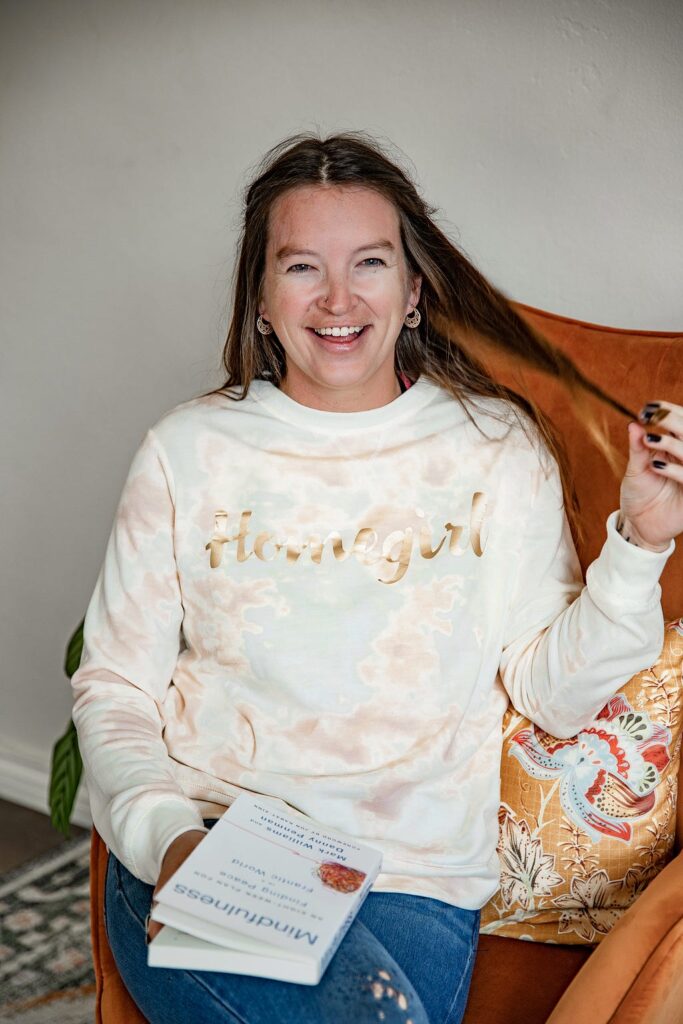An Interview With Drew Gerber
Be intentional with your purchases. Save for later on Amazon is useful for this! Wait two weeks to see if you still want to buy. This will show you if it is an impulse buy or if you truly want it.
We live in a time of great excess. We have access to fast fashion, fast food, and fast everything. But studies show that all of our “stuff” is not making us any happier. How can we simplify and focus on what’s important? How can we let go of all the clutter and excess and find true happiness? In this interview series, we are talking to coaches, mental health experts, and authors who share insights, stories, and personal anecdotes about “How Simplifying and Decluttering Your Life Can Make Us Happier.” As a part of this series, I had the distinct pleasure of interviewing Theresa Russell.
Theresa Russell is an intentional home organizer, marriage family therapist, and energy healer. As the Founder + CEO of Home and Heal, she works with purpose driven women to release mental and physical clutter to create an energetically aligned and organized life.
Prior to becoming an entrepreneur, she spent 10 years as an educator teaching preschool and elementary school kids.
She is a frequent speaker on creating a peaceful home, awareness of attachments to physical items, and intentional living tips for couples. As a sought-after media source, Theresa’s tips have been featured on multiple podcasts and in Homes and Gardens.
Thank you so much for doing this with us! Before we dive in, our readers would love to “get to know you” a bit better. Can you share your “backstory” with us? What was it that led you to your eventual career choice?
I started my business based off personal experience. I moved into a loft where there were no closets or storage. I had to get very creative in the way that I lived my life. I did not have room for excess items, so it made me reflect on what was important to me. I realized I was skilled at being organized, and more importantly it lit me up, so I decided to pivot from teaching to help others in creating their sanctuary.
Can you share the most interesting story that happened to you since you started your career?
Experiencing different spaces and learning about my clients! Every item that someone keeps in their home paints a picture of who they are. Viewing this with curiosity, not judgment, is one of my favorite pieces of what I do.
Are you working on any exciting new projects now? How do you think that will help people?
I am creating a 6-month container called Sacred Space. A large part of being organized is home and lifestyle habits. Things like how you shop, mindfulness with putting things away, and reflection around your space. This container will guide you to a greater awareness of this while shifting out of the habits that are not supporting you.
A lot of these habits are formed due to a deeper belief or because of how we were conditioned in our childhood. This takes more than one organizing session to feel supported. I am combining all the modalities I have learned over the years to create a nurturing space.
Can you share with our readers a bit about why you are an authority on the topic of “How Simplifying and Decluttering Your Life Can Make You Happier”?
I am an intentional home organizer. One of the main ways I work with clients is through an offering called Declutter & Donate. This is a 3-hour session where I guide you in assessing what you are ready to let go of and what still lights you up. After, I take the donations to local sustainable businesses to be repurposed.
Ok, thank you for that. Let’s now jump to the main focus of our interview. We live in a time of excess. We have access to so much. But studies show that all of our “stuff” is not making us any happier. Can you articulate for our readers a few reasons why all of our possessions are not giving us happiness?
We often look outside of ourselves to be fulfilled. With items, this can look like online shopping or “retail therapy”. It can be easier to ignore the tough emotions in exchange for a dopamine hit. Stuff might give us that temporary distraction but ultimately, we still have things we need to work through.
On a broader societal level, how do you think this excessiveness may be harming our communities and society?
I see a ton of unused items daily! Things that are just sitting on shelves, gathering dust. Most of the items we donate end up in landfills. Not only that but we are using precious resources to make these items. The fashion industry is one of the main contributors to pollution. If we continue to make purchases the way we do, we will always be wanting more. It is so vital that we be intentional not only for our mental health but for our planet.
The irony of struggling with happiness in modern times is glaring. In many places in the world today, we have more than ever before in history. Yet despite this, so many people are unhappy. Why is simplifying a solution? How would simplifying help people to access happiness?
Simplifying creates space for things such as emotions, quality time, and better health. When we are content with ourselves, we do not need as much. We are not looking for something to fill a void because we feel whole.
Can you share some insights from your own experience? Where in your life have you transformed yourself from not having enough to finally experiencing enough? For example, many people feel they don’t have enough money. Yet, people define abundance differently, and often, those with the least money can feel the most abundant. Where in your health, wealth, or relationships have you transformed your life?
I am a recovering alcoholic. I have been sober now for 17 months. This was a huge transformation for me. I would avoid my emotions, numbing through alcohol. We did not talk about much in my home growing up, including our feelings. I would shut down when I felt uncomfortable in any way. At one point in my late teens this included avoiding through shopping too. I did not want to sit with myself.
At some point it started impacting my relationship. I was finally ready to admit I did not have a healthy relationship with alcohol. So much more space has opened for me since I gave up drinking. I appreciate how to have tough conversations and accept ALL my emotions.
People, places, and things shape our lives. For example, your friends generate conversations that influence you. Where you live impacts what you eat and how you spend your time. The “things” in your life, like phones, technology, or books impact your recreation. Can you tell us a little about how people, places, and things in your own life impact your experience of “experiencing enough?”
To be honest, this is something I am still learning. I find that when I come back to gratitude I experience enough. Not in a forceful way either. Whether it is something bigger like the relationship with my fiancé or soaking up the sun in my backyard. There is no room for fear or lack when love is in your heart.
What advice would you give to younger people about “experiencing enough?”
Be present with yourself. Life is easier the more you know, learn, and accept yourself. Also, I know this is cliché- but appreciate the little things! Those are typically what stand out in your memory as time passes.

This is the main question of our interview. Based on your experience and research, can you share your “five ways we can simplify and declutter our lives to make us happier?”
- Reflect on what you have. We often grow but not alongside our home. Ask yourself what matters most to you. What are your values? How do you want to feel in your space and life? What are items that embody this?
- Declutter bit by bit! Breaking things down into small and manageable steps is key. Set a timer for 20 minutes or tackle a certain area. For example, today I am going to declutter my t-shirts.
- Ground. Feeling safe in your mind and body is important. If your home is overwhelming you, take some breaths or step outside. Name items you see, hear, and feel. This will help you reset your nervous system.
- Be intentional with your purchases. Save for later on Amazon is useful for this! Wait two weeks to see if you still want to buy. This will show you if it is an impulse buy or if you truly want it.
- Follow the one-minute rule. If something takes under five minutes or less, get it done right then and there. This way things don’t pile up. For example, sorting the mail or putting your shoes on the rack.
You are a person of great influence. If you could inspire a movement that would bring the most amount of good to the most amount of people, what would that be? You never know what your idea can trigger. 🙂
A world where everyone has a safe space with their basic needs met. My goal in the future is to create a non-profit with the donations my clients let go of. This will create the opportunity for free to low-cost clothing, toys, books, and more for those who need it.
How can our readers further follow your work online?
You can follow me on @home_and_heal on Instagram! I love hearing your intentions for your space and life.
Thank you so much for these insights. This was so inspiring, and so important!
Theresa Russell Of Home and Heal On How Simplifying & Decluttering Your Life Can Make You Happier was originally published in Authority Magazine on Medium, where people are continuing the conversation by highlighting and responding to this story.
